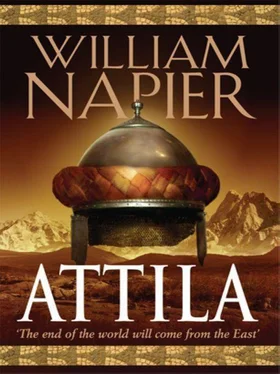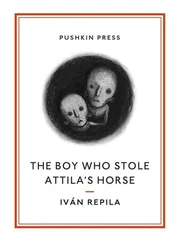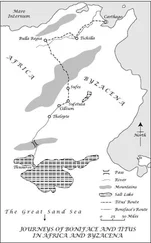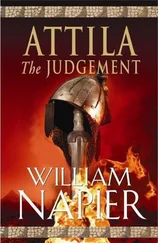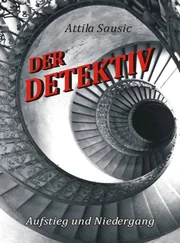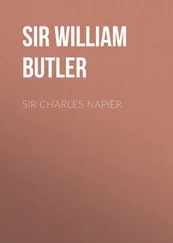William Napier - Attila
Здесь есть возможность читать онлайн «William Napier - Attila» весь текст электронной книги совершенно бесплатно (целиком полную версию без сокращений). В некоторых случаях можно слушать аудио, скачать через торрент в формате fb2 и присутствует краткое содержание. Жанр: Исторические приключения, на английском языке. Описание произведения, (предисловие) а так же отзывы посетителей доступны на портале библиотеки ЛибКат.
- Название:Attila
- Автор:
- Жанр:
- Год:неизвестен
- ISBN:нет данных
- Рейтинг книги:5 / 5. Голосов: 1
-
Избранное:Добавить в избранное
- Отзывы:
-
Ваша оценка:
- 100
- 1
- 2
- 3
- 4
- 5
Attila: краткое содержание, описание и аннотация
Предлагаем к чтению аннотацию, описание, краткое содержание или предисловие (зависит от того, что написал сам автор книги «Attila»). Если вы не нашли необходимую информацию о книге — напишите в комментариях, мы постараемся отыскать её.
Attila — читать онлайн бесплатно полную книгу (весь текст) целиком
Ниже представлен текст книги, разбитый по страницам. Система сохранения места последней прочитанной страницы, позволяет с удобством читать онлайн бесплатно книгу «Attila», без необходимости каждый раз заново искать на чём Вы остановились. Поставьте закладку, и сможете в любой момент перейти на страницу, на которой закончили чтение.
Интервал:
Закладка:
At last, with wine-jugs and dishes nearly empty, the court chamberlain arose, banged his golden staff on the ground, and prayed silence.
‘Your Divine Majesty,’ he said, bowing so low to the emperor that it looked as if he might slip a disc. ‘The most beauteous Princess Galla, senators, masters-general, prefects praetorian, magistrates, bishops, legates, quaestors, lictors, ladies and gentlemen assembled, I give you our most esteemed poet, the equal of Lucretius, nay, Virgil, nay of great Homer himself – ladies and gentlemen: pray silence for Claudius Claudianus.’
To a rather thin scattering of applause, a fat, sweaty, dark-complexioned man got to his feet and looked anxiously around at the three hundred guests. One or two smiled politely back. They knew what was coming.
The poet craved their pardon, begged their indulgence, and nodded and bobbed repeatedly towards the imperial dais, although he never quite managed to raise his eyes directly to it, for fear, no doubt, that he might be dazzled and blinded for life by His Imperial Majesty’s effulgence. Then, producing an ominously thick scroll from the folds of his toga, he declared, in a surprisingly strong and sonorous voice, that he would like to read to the assembled company a brief panegyric he had dashed off that morning, in praise of the emperor’s magnificent victory over the barbarian hordes; and he asked his listeners’ forbearance, since he had only had so brief a time to work on it.
In fact, it was well-known that Claudian had literally dozens of panegyrics already written and stashed away in the library of his handsome villa on the Esquiline, designed to cover every conceivable occasion, and to be brought out as and when required. But everyone was too polite to say so. Besides, for all the snide comments made behind his back, Claudian was very popular with the emperor.
He coughed once and began.
‘O beloved Prince, fairer by far than the day star,
Who shootest thine arrows with an aim more sure than the Parthians,
What stumbling praise of mine shall match thy lofty mind?
What encomia thy brilliance and thy beauty?
‘On a couch of gold midst Tyrian purples didst thy mother give thee birth,
And then what presages were there for good fortune!
Horned Ammon and Delphi, so long dumb, now broke their silence,
And the rock of Cumae, shrine of the raging Sibyl, spoke again!’
The burly legate beside Stilicho shifted on his elbow and muttered sourly, ‘Don’t remember that myself.’
‘I think I’m going to puke,’ mumbled the general in return. ‘And it’s not those dodgy British oysters, either.’
The two men bowed their heads and stifled their chuckles.
On the dais, Galla turned her head.
There was more.
‘When in the heat of the chase, thou guidest thy coursing steed
Amid the towering holm-oaks, thy tossing locks streaming out in the wind,
Surely the beasts of their own accord fall before thine arrows,
And the lion, right gladly wounded by a prince’s sacred hand,
Welcomes thy spear and is proud so to die!
‘When after thy toils of venery thou seekest the shade of the woods,
And freest thy weary limbs in dreaming sleep,
What a passion of love inflames the Dryads’ hearts,
How many a Naiad steals up with trembling foot to snatch an unmarked kiss!’
Many guests chuckled appreciatively at this delightful image. Even the emperor himself giggled into his goblet. Claudian paused generously to allow him to do so, before resuming again.
For there was yet more.
‘Who, though he be more uncivilised than the wild Scythian,
And more cruel than the beasts, but will,
On seeing near at hand thy transcendent loveliness,
Not readily seize the chains of slavery,
And offer thee a ready servitude?’
Attila tested the little fruit-knife against his thumb-pad.
‘Then shall all the world bow to thee, O most noble Prince!
E’en now I foresee the sack of distant Babylon,
Bactria subjected to the Law, the fearful pallor of the Ganges’ banks before thy name!
For to you all the world shall bend the knee;
The Red Sea give you precious shells, India her ivory,
Panchaia perfumes, and China bolts of yellow silk.
And all the world confess your name, your empery
That is without limit, without age or boundary!’
The applause lasted almost as long as the poem.
A little later on in the banquet, Galla was passing behind the couches, on her way to speak to one of her chamberlains, when she happened to overhear a drunken and indiscreet guest asking his neighbour absent-mindedly if the emperor himself had even been at the Triumph that day?
‘Because if he was, I certainly didn’t notice him,’ slurred the guest. ‘Like everyone else, I was all eyes on the divine Stilicho!’
Galla paused.
Unaware that they were being listened to, the other guest said sotto voce, ‘Our Sacred Majesty was probably too busy feeding his pet chickens.’
They chuckled furtively into their goblets of wine. Then one of them glanced up and caught sight of the princess standing right behind them. The warm wine he was swallowing came painfully back up his throat.
Galla leant forward and plucked a fried lark from the silver dish beside them.
‘Pray continue,’ she said, smiling sweetly, as she snapped the little bird’s legbones in two.
She arranged further business with her head chamberlain, who nodded and departed soon after. Returning to the imperial dais, she noticed that, amid the hubbub of the hostage children, the Hun brat was nowhere to be seen.
She summoned another attendant, who told her that he had been excused.
‘How long ago?’
‘Well,’ stammered the attendant, a runnel of sweat coursing down his brow, ‘some while ago now.’
‘Go and get him.’
The attendant searched the lavatories high and low. There was no sign of Attila. He made his way back to his cell in the slave quarters, knowing his time at the palace was ended, and prepared for the worst.
The Hun boy was by now moving stealthily around the Great Court, in the cool green shadows of the Dolphin Fountain.
The palace was no easier to break out of than to break into. But Attila had planned his escape with meticulous care, patiently observing every movement of the palace guards over this past year of his captivity, every locking and unlocking of the gates, and picking up every whispered password. Despite his native ferocity, he could be patient when need be. His father, Mundzuk, had always told him that patience was one of the great virtues of all nomad peoples. ‘Nothing can hurry the sun,’ he would say. The wide-wandering Huns were certainly good at waiting, and the boy himself had all the patience and rhythm of the nomad. Useless to struggle against the sandstorm – but the moment the sandstorm ceased you could take your chance. Seize it in your fierce hands for it might not come again. The Romans were like men trying to move the sands of the desert, like the sands of the Takla Makan when the east wind blew – and in the night the wind came and blew the sand back again. Their work would never be done.
The boy had also worked out the rules governing the frequency with which the palace password was changed, and felt nothing but scorn at how easy it was. From the kalends to the ides of each month, the password was changed at noon; and from the ides back to the next kalends, it was changed at midnight. In other words, eavesdrop on the password used just after midnight in the second half of any month, and it would get you through any gate in the palace until the following midnight.
He had even worked out the encryption system commonly used around the palace, and, again, was scornful at its laziness and complacency: like a Greek merchant over-confident of the safety of his ships at sea, even in the stormy, dog-star month of October.
Читать дальшеИнтервал:
Закладка:
Похожие книги на «Attila»
Представляем Вашему вниманию похожие книги на «Attila» списком для выбора. Мы отобрали схожую по названию и смыслу литературу в надежде предоставить читателям больше вариантов отыскать новые, интересные, ещё непрочитанные произведения.
Обсуждение, отзывы о книге «Attila» и просто собственные мнения читателей. Оставьте ваши комментарии, напишите, что Вы думаете о произведении, его смысле или главных героях. Укажите что конкретно понравилось, а что нет, и почему Вы так считаете.
